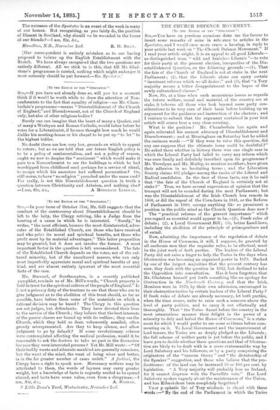[To THE EDITOR OF THE " SPECTATOR." I 'Si,—In your
issue of October 31st, Mr. Gill suggests that the conduct of the controversy about Disestablishment should be left to the laity, the Clergy retiring, like a Judge from the hearing of a cause in which he is interested. "Surely," he writes, "the most efficient, because the most disinterested, advo- .cates of the Established Church, are those who have received and who prize its moral and spiritual benefits, not those who profit most by its material advantages." This latter proposition may be granted, but it does not involve the former. A most important factor in the question is left unconsidered. The fate of the Established Church depends on the votes, not of the cul- tured minority, but of the uncultured masses, who can only most imperfectly appreciate moral and spiritual benefits of any kind, and are almost entirely ignorant of the most essential facts of the case.
Mr. Steward, of Southampton, in a recently published pamphlet, reminds us of Mr. Mill's words, "Church property is held in trust for the spiritual culture of the people of England." Is it not a primary duty of the trustees to see that those who are to give judgment as to the abolition of this trust should, as far as possible, have before them some of the materials on which a rational decision may be based ? The Clergy in this question are not judges, but defendants. They have devoted their lives to the service of the Church ; they believe that the best interests of the poorer classes are bound up with its welfare; they see the 'Church, which they hold so dear, vehemently assailed, often grossly misrepresented. Are they to keep silence, and allow judgment to go by default ? If some revolutionary scheme were contemplated affecting the medical profession, would it be reasonable to ask the doctors to take no part in the discussion because they were interested persons ? Yet Mr. Mill wrote : —" Of their bodily wants and ailments mankind are generally conscious, but the want of the mind, the want of being wiser and better, is in the far greater number of cases unfelt." A fortiori, the Clergy have a right to speak now. Mercenary motives may be attributed to them, the words of laymen may carry greater weight, but a knowledge of facts is urgently needed to be spread abroad, and facts have some value, even from a clergyman.—I
43 Little Dean's Yard, Westminster, November 2nd.






































 Previous page
Previous page